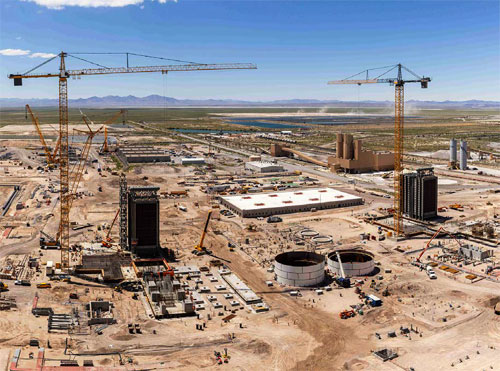GOAL IS 75 PERCENT REDUCTION IN CARBON EMISSIONS
Two giant gas turbines have been delivered to the IPP Renewed power project near Delta as the massive rebuild of the former coal-fired power generation station continues toward its planned completion and commercial operation in 2025.
Mitsubishi Power delivered the two M501JAC advancedclass gas turbines — the cornerstone of the project’s utilization of hydrogen for power generation — in July. The turbines weigh 694,000 pounds (347 tons) each and journeyed from Japan to the IPP Renewed site via ship, train and truck, traveling over 5,800 miles in about{mprestriction ids="1,3"} 30 days.
The Intermountain Power Agency (IPA) is an organization of 23 Utah municipalities formed to finance, construct, operate and maintain the Intermountain Power Project, which began commercial operations as a coal-burning power plant in 1986. In addition to electricity generation resources located near Delta, the project owns two high-voltage transmission systems — one connecting to the western power grid in Utah and a direct current line extending 490 miles to Adelanto, California. IPA is currently constructing the IPP Renewed project for the benefit of its power purchasers serving parts of six states, including large municipal power systems in Southern California.
The IPP Renewed project’s gas turbines will utilize 30 percent hydrogen fuel at start-up in 2025, with a goal of achieving 100 percent hydrogen usage by 2045 and ultimately resulting in dispatchable carbon-free utility- scale power generation. This blend of natural gas and hydrogen will reduce carbon emissions by more than 75 percent when compared to IPP’s coal operations. Once installed and in operation, the turbines will deliver 840 megawatts of net generation output. Mitsubishi Power will provide service and maintenance for the gas turbines under a 20- year service agreement. TIC (The Industrial Co.), a subsidiary of construction giant Kiewit, is the engineering, procurement and construction contractor for the project.
In 2019, Mitsubishi Power, in partnership with Magnum Development, announced plans to develop the Advanced Clean Energy Storage project (ACES Delta hub), located adjacent to IPP. The ACES Delta hub is a utilityscale renewable energy hub that will produce, store and deliver green hydrogen to the western United States. A pipeline from the ACES Delta hub will feed the IPP Renewed project with hydrogen to operate the turbines. The ACES Delta hub will use renewable energy-powered electrolyzers to split water into oxygen and hydrogen. The hydrogen will be stored in two underground salt caverns, each the size of the Empire State Building, capable of holding 150,000 megawatthours of clean energy. It would take more than 80,000 shipping containers of lithium-ion batteries to produce the equivalent megawatt-hours of energy that one hydrogen salt cavern can store.
“With the delivery of these two highly flexible J-Class gas turbines from Mitsubishi Power Americas, the IPP Renewed project is well on its way to becoming a beacon of innovation, paving the way for a cleaner, dispatchable energy footprint in the region,” said Cameron Cowan, general manager of the Intermountain Power Agency.
Bill Newsom, president and CEO of Mitsubishi Power Americas, said, “As we continue to support our customers with advances in clean energy technology, IPP Renewed is a perfect example of a real, steel-on-theground project. The project demonstrates that bringing together the right partners with the right capabilities supports essential renewable energy infrastructures emergence and moves the country further along the path to netzero emissions. The long journey they traveled and final delivery of these two state-of-the-art gas turbines is just the first of many milestones we look forward to celebrating with IPA.”{/mprestriction}








